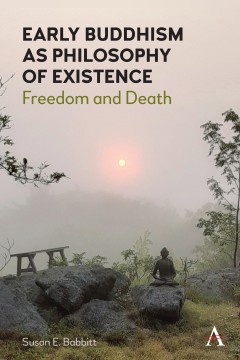- About This Book
- Reviews
- Author Information
- Series
- Table of Contents
- Links
- Podcasts
About This Book
Philosophical liberalism is the dominant view in the world today. Even those who reject liberalism philosophically, subscribe to its view of freedom, which is a negative view, common to liberalism, libertarianism, and anarchism. The alternative is recognition of nature, thoroughly, applied fully to human beings. The Buddha set it out as a philosophy, and he lived it. It was a practice.
It brings death back into life. The common view is that death is the opposite of life. Yet death is part of life, from the beginning. We see this in many great writers, Dostoevsky, for example. His characters find human communion in suffering, despite their differences. Contradictions are inherent in life, but we find our way, not a single way. It brings realism back, which is truth.
It has been present in human societies throughout history. It has been banished because of a false view of truth, connected to a false view of freedom. It could be recognized as philosophy. The Buddha taught people simply. There was no dogma. He did not teach them to follow him but to be masters of their own salvation. Unless this view is recognized as Philosophy, as it should be, including truth, it will again become religion, rather than a way of life, an art of living.
Reviews
‘The strength of this book is its interdisciplinary nature. Babbitt fuses her knowledge of world literature and world philosophies with her experience of vipassanā Buddhist meditation in the West, most particularly its message about seeing things as they are, both within oneself and in the world. The result is a novel and challenging exploration into the way in which Buddhist concepts converge with and speak to existential themes present in our global literary and philosophical heritage.’—Elizabeth Harris, Department of Theology and Religion, Honorary Fellow, Edward Cadbury Centre, University of Birmingham, UK
‘The book offers a powerful meditation on the ways in which key aspects of Buddhist philosophy bear on and challenge philosophical liberalism using arguments and insights that derive from the uniquely positioned, embodied knowledge of the author herself. The book’s experiential emphasis is fresh, interesting and intellectually boundary-crossing, coming from a professional philosopher. The author’s use of literary examples combines with an accessible yet poetic narrative style to create a text that invites readers to reflect on some of the most important ideas and questions of our day while offering new (and liberating) views of the relation between human death and human freedom.’—Lauren Leve, Associate Professor, The University of North Carolina at Chapel Hill, USA
‘I don’t know anyone who has described more movingly what it is to live in the shadow of death. I am grateful to have known her, and take inspiration from her truthfulness, humility and calm acceptance.’ —William Hart, Editor, Translator, Writer and Teacher; Author of The Art of Living: Vipassana Meditation as Taught by S. N. Goenka
Author Information
Susan E. Babbitt is author of four books in philosophy and one edited collection. She has practised Vipassana meditation for 16 years.
Series
Table of Contents
Acknowledgements; Introduction; 1. Why Philosophy of Existence?; 2. The Art of Dying is the Art of Living: Rationality; 3. Relational Philosophy and the Law of Dead Ends; 4. Living Philosophy, and Philosophy Must be Lived; Conclusion; Bibliography; Index.
Links
Stay Updated
Information
Latest Tweets



